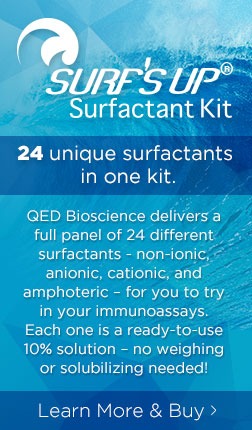Alpha-1-Antitrypsin (13701P-1000)
$3,399.00
SKU: 13701P-1000
Categories: Products, Recombinant Proteins
Overview
Product Name Alpha-1-Antitrypsin (13701P-1000)
Description Recombinant Human A1AT produced in E. coli is a single, non-glycosylated polypeptide chain containing 393 amino acidsaa 25-418) with a molecular weight of 44.4kDa.
Target Alpha-1-Antitrypsin
Species Reactivity Human
Applications WB
Source Escherichia coli
Properties
Form Liquid
Concentration Lot Specific
Formulation Sterile-filtered colorless solution contains 20mM Tris-HCl, pH 7.5, 1mM DTT, 10% glycerol, and 2mM EDTA.
Buffer Formulation 20 mM Tris
Buffer pH pH 7.5
Buffer Cryopreservative 10% glycerol
Purity Greater than 90% as determined by SDS-PAGE
Background Alpha-1-antitrypsin (A1AT) is a serine protease inhibitor that inhibits the catalytic domain of elastase, plasmin, collagenase, thrombin, leucocytic proteases, trypsin, chymotrypsin, and plasminogen activator. Defects in the A1AT gene can lead to emphysema or liver disease. Increased levels of serum A1AT are found in cases of lung and prostate cancers and as an acute phase response to tissue necrosis and inflammation.
Specificity Information
Target Name Alpha-1-antitrypsin
Target ID Alpha-1-Antitrypsin
Alternative Names A1AT
Sequence MEDPQGDAAQ KTDTSHHDQD HPTFNKITPN LAEFAFSLYR QLAHQSNSTN IFFSPVSIAT AFAMLSLGTK ADTHDEILEG LNFNLTEIPE AQIHEGFQEL LRTLNQPDSQ LQLTTGNGLF LSEGLKLVDK FLEDVKKLYH SEAFTVNFGD TEEAKKQIND YVEKGTQGKI VDLVKELDRD TVFALVNYIF FKGKWERPFE VKDTEEEDFH VDQVTTVKVP MMKRLGMFNI QHCKKLSSWV LLMKYLGNAT AIFFLPDEGK LQHLENELTH DIITKFLENE DRRSASLHLP KLSITGTYDL KSVLGQLGIT KVFSNGADLS GVTEEAPLKL SKAVHKAVLT IDEKGTEAAG AMFLEAIPMS IPPEVKFNKP FVFLMIDQNT KSPLFMGKVV NPTQK.
Background Alpha-1-antitrypsin (A1AT) is a serine protease inhibitor that inhibits the catalytic domain of elastase, plasmin, collagenase, thrombin, leucocytic proteases, trypsin, chymotrypsin, and plasminogen activator. Defects in the A1AT gene can lead to emphysema or liver disease. Increased levels of serum A1AT are found in cases of lung and prostate cancers and as an acute phase response to tissue necrosis and inflammation.
Handling
Storage Although stable at 4°C for 4 weeks, product is best stored at or below -20°C. For long-term storage, addition of a carrier protein (such as 0.1% HSA or BSA) is recommended. For in vitro investigational use only.
Dilution Instructions Dilute in PBS or medium that is identical to that used in the assay system.
References & Data Sheet
Data Sheet  Download PDF Data Sheet
Download PDF Data Sheet
 Download PDF Data Sheet
Download PDF Data Sheet


